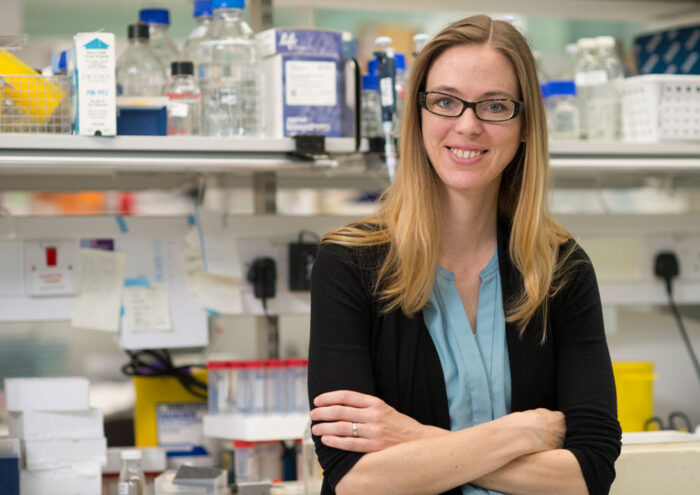
Madeline Lancaster, Group Leader in the LMB’s Cell Biology Division, is one of six scientists to be awarded a prestigious Vallee Scholarship in 2021. The Vallee Foundation seeks to promote an international scientific community, enhance collaboration and communication among scientists and to advance medical education and biomedical research by bestowing grants to young, exemplary scientists conducting biomedical research.
Madeline has been recognised for her groundbreaking research using cerebral organoids – mini-brains comprised of 3D tissues grown from human stem cells – to investigate human brain development. This pioneering methodology has allowed, for the first time, the complexity of the developing brain to be replicated in vitro. Such a feat has given Madeline’s group the chance to examine numerous unique characteristics of the human brain, where previous approaches using model organisms have not been viable.
One such application is the use of cerebral organoids to study the development of the human brain to answer a fundamental question of life: how do human brains set us apart from other mammals? Recent research from the group has helped identify why human brains are comparatively large in relation to other primates. The group compared developing organoids and found that, in humans, a delay in the transition from stem cells to neurons allowed the organoid to grow to a much larger size than organoids from ape stem cells.
This technology also has huge disease-related implications. Madeline has used cerebral organoids to learn about the development of neurological diseases unique to humans, for example microcephaly where the brain is too small. By examining organoids from patient cells, the group has been able to examine mechanisms of pathogenesis during organoid development. Furthermore, recently the group has shown a further application of these organoids in their investigation of how SARS-CoV-2 – the virus responsible for COVID-19 – is able to infect cells in our brain and produce new virus within choroid plexus (ChP) epithelial cells, which may cause long-term neurological impacts such as chronic fatigue.
Madeline joined the LMB in 2015, after completing her post-doctoral fellowship in Dr. Juergen Knoblich’s lab at the Institute of Molecular Biotechnology of the Austrian Academy of Sciences (IMBA) in Vienna, Austria where she established the technology behind cerebral organoids. Prior to this she earned her PhD in Biomedical Sciences from the University of California, San Diego for a thesis project in Professor Joseph Gleeson’s lab studying signalling at the primary cilium and its implications in the genetic disorder Joubert syndrome. She received her undergraduate degree in Biochemistry in 2004 from Occidental College in Los Angeles, California.
‘I am truly honoured to be among this year’s awardees of this prestigious prize. It is fantastic for myself and my lab to be recognised in this way, and the award will make a big impact for our future research,’ Madeline commented.
Further references:
Madeline’s group page
Madeline Lancaster: The accidental organoid – mini-brains as models for human-brain development
The Vallee Foundation – Six New Vallee Scholars